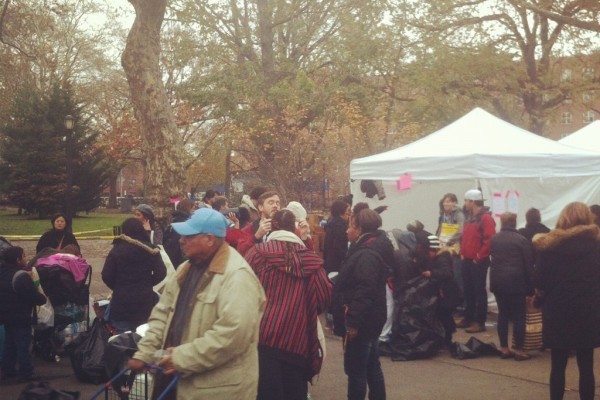Ford Sypher knows something about closing a circle, making a healthy return. When I asked the former regional director in Team Rubicon, the organization of U.S. military veterans devoted to disaster relief, to elaborate on his description of the group’s dynamic—“We’re providing service to those most in need—while helping save ourselves,” Sypher told a reporter in 2012—he said that members who left social frameworks in the military can rebuild them within communities that need their help.
“It creates a feeling of belonging,” he told me over the phone. “I think service does make a person whole.”
Sypher began working for Team Rubicon in 2010, after tours in Iraq and Afghanistan as an Army Ranger. He arrived in Rockaway two or three days after the storm, he said, when team members had already started mucking out flooded homes and helping city workers unblock roads, and helped establish a volunteer reception center to organize the thousands that he and other disaster relief professionals predicted would soon come to the peninsula, wanting to help.
That prediction was correct: 10,000 people volunteered for Team Rubicon by the end of its operation on the peninsula. Sypher said that the organization, which began when its founders traveled into Haiti after the 2010 earthquake, thrives in part because of its “structured hierarchy in which tasks are done, and they’re also audited, and reported.” It’s interesting to consider the contrast between this model and Occupy Sandy’s: clearly, there are different ways to respond to a disaster.
But like every other group I researched, Team Rubicon used social media to advance its work. Sypher said that team leaders would report from the field, and a dedicated social media team would then edit and share the material.
A student of anthropology and political science at Columbia University when we spoke, Sypher also placed the platforms in context.
“You could say that social media was the proverbial telephone pole in the middle of the park that everyone stamped a sign to,” he said. “It’s nothing that’s necessarily new, it’s just moving faster. There’s different platforms which allow us to continue to post on that...pole, if you will.”
Sypher said that working with veterans who had different experiences while enlisted—as a Ranger, Sypher said, he was “totally isolated” from the regular military—made him “more compassionate” about their challenges and sacrifices.
And there was another blessing about Team Rubicon’s work.
“It felt good to bring my colleagues home, because a lot of my colleagues didn’t get to come home,” he said. “I think that was very, very rewarding to me. Then in turn working in the community just compounds that reward.”
Thinking back to his time in the organization, Sypher mentioned “the camaraderie” and “the work.” Near the end of our interview, he offered some thoughts about disasters, relationships, and love.
“Immediately after these kinds of events, people will go searching for a love story,” he said. “The reunion, or the Sandy baby. To me what’s interesting, and often not talked about, is that...love starts with friendship, which leads to trust; trust, which leads to a relationship. People who talk about unconditional love, well, I generally think that’s silly. Love is something which is truly conditional.
“Individuals who go through something as traumatic as Sandy, who are able to reach out and lean on one another, can get conditioned to knowing each other’s strengths, then...knowing each other’s weaknesses. They have a far greater understanding of what love is. They were really conditioned how to love because of the situation they found themselves in.”
